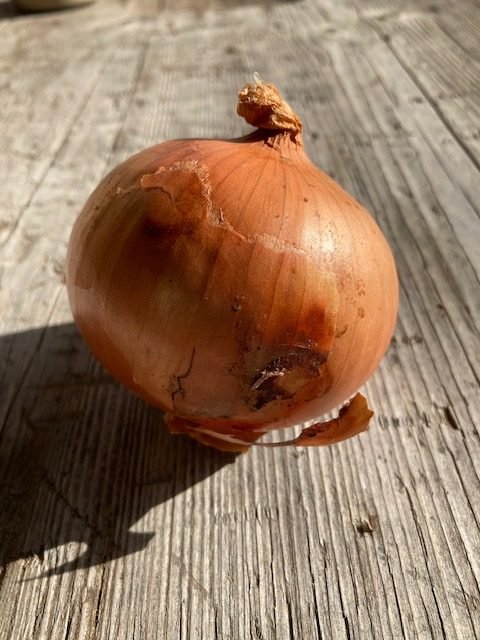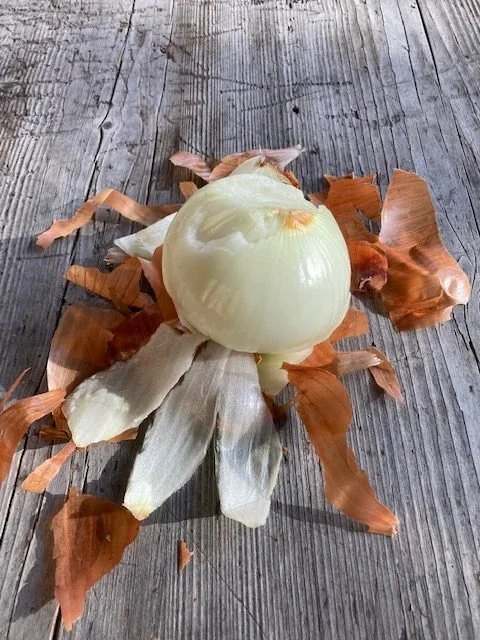'TWAS A SHAME
Many years ago, when yet another person tried convincing me to write my memoir, I jokingly told him that if I ever did, I’d call it, “My Life as an Onion.” Because doesn’t it so often feel like the layers are never-ending and doesn’t peeling them often makes you cry? I recently peeled off another layer that I thought I’d peeled off long ago. Such a surprise! And like most revelations, it seemed so obvious once exposed. Who knew that onion bulbs were like light bulbs; they both blind you and yet, metaphorically, they also enlighten us.
I do realize that I’m trying to be rather clever here in an attempt to put off owning that my most recent revelation, while relieving me of a sense of shame, also inflicted disappointment on another soul, which is enough to bring on another layer of shame and there’s that bloody onion again!Shame is a terrible disease that we catch during childhood, passed on to us by parents, teachers, and religion. Our work as adults is to cure ourselves of it, not only for our own wellbeing but so that we don’t keep passing it on.
I don’t know about you, but during this pandemic I have felt optimistic and hopeless, energized and paralyzed. I have prioritized and de-prioritized; been 100% sure about some things only to completely change my mind weeks or months later. I’ve made promises and decisions based on self-imposed should’s, external pressures, and fear. I’ve sworn I’d never fly again, yet last month flew to Berlin and on Friday will fly to London. I try to rationalize this by saying, well, I didn’t fly for 18 months when normally I would have flown at least 10 times during a similar period pre-Covid. But I still feel a bit ashamed.
I also decided, undecided, decided and undecided to sell our London flat because if privilege was a dirty word before Covid, post-Covid it feels like a crime. How could we own two homes when so many have none?
The inescapable, simultaneous realities of a pandemic and climate change have, to some degree or another, mentally unhinged many, if not all of us. The sense of danger and urgency we feel makes it difficult to make decisions, and difficult to have faith in ourselves and each other. This sort of whirling instability makes any effort at personal evolution confusing and challenging. For those of us who are isolated and/or low on creative energy as a result of these events, it threatens our sense of self and casts doubt on our needs and wants, to the point where one begins to question whether one even deserves to want or need.
This constant questioning of our right to feel what we feel may have been an issue for much of our lives…living through a pandemic heightens it. I’ve struggled with my continuing attachment to England during the decades that I’ve lived outside of my homeland. Surely there was something wrong with me to still have this attachment? Why couldn’t I just let go and be grateful for all that I do have. After all, America gave me my daughter, my husband, stepchildren, friends, an MFA degree, a career, and sobriety. And moving to Tuscany 8 years ago with Joel gave us a deeper connection to each other because we were literally on common, neutral ground.
It is impossible to explain to people who have never lived outside their own country that one’s place of origin is, and always will be, deep within us. Likewise, I will never know what it is like to live one’s whole life in the land of one’s birth. One would think that between Brexit and Boris, detaching from England would be easier. But I’ve never been fond of the UK’s politics; that’s not where my identity lies. It lies in the land itself, the way I feel a total sense of belonging when I walk down a country lane or stride out on the cliffs of Cornwall. And although the English population is, like everywhere, riddled with nationalism, racism and misogyny, there are still enough people with their wit and kindness intact to make me feel at home.In the 1990’s I wrote and performed a play Off Broadway called: Give It Up. The central character, like myself, was an adoptee and the arc of the play was about belonging. Maybe my attachment to being English has to do with it being the one thing about my childhood to which I not only felt a sense of belonging, but which also can’t be taken away from me. So, it’s interesting that I’ve been trying to “give it up” all these years, as if subconsciously I don’t believe I deserve to belong.
The sense of shame, of being undeserving, of not belonging is, of course, something many people experience. For adoptees it is our birthright.
I’m claiming my Englishness now, not because I deserve it but because it just is. We feel what we feel and that’s okay, pandemic or no. As for the climate crisis, I’m letting go of the 'all or nothing' approach and am just trying to do my best. We’ve upped our recycling; no longer buy plastic water bottles; we take empty containers to our grocery stores and have the food put directly into them instead of into more plastic and we reuse our paper bags until they fall apart at which point they become fire-starters. We’ll go to England less often but stay longer, cutting down on frequent flying. If we all did 10% more and consumed 10% less, we’d make a huge difference to climate change, which in turn would help ward off future pandemics.
There are events in our lives for which we have real guilt and obviously it behooves us to own those and make amends where possible. But feeling ashamed of who we quintessentially are is a sad waste of time. However, it’s never too late to make amends to ourselves.
I hope you are all being kind to yourselves today.
With love, Maggie

